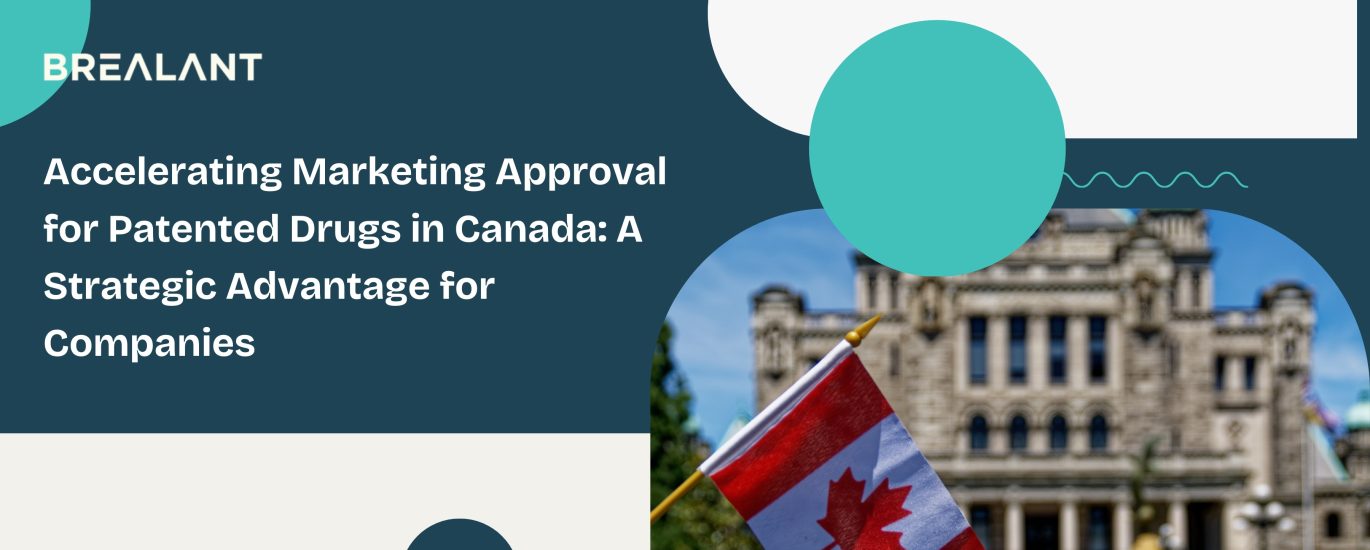



The pharmaceutical industry functions within the complex innovation, regulation, and market conditions framework. Success highly depends on the fast and effective acquisition of marketing authorisation of novel drugs, specifically patent-protected ones. A potent healthcare system and a growing market like Canada present a huge opportunity for companies to promote their advanced medications. However, getting through the regulatory procedure to receive market approval can be very time-consuming and resource-intensive. This article explains the strategic benefits of expediting the marketing approval procedure for patented drugs in Canada.
Health Canada oversees Canada’s drug clearance process and checks new medications for quality, safety, and efficacy before approving them for sale. This method consists of two main stages:
1. Clinical Trials Application (CTA): To meet safety and scientific requirements, companies must submit a Clinical Trial Application (CTA) before testing a drug on humans in Canada.
2. New Drug Submission (NDS): Following the conclusion of clinical trials, Companies submit an NDS to Health Canada. The submission thoroughly covers the drug’s composition, manufacturing process, clinical trial results, and proposed labelling.
3. A Notice of Compliance (NOC) and a Drug Identification Number (DIN), which are necessary to sell the medication in Canada, these certificates are issued by Health Canada following examination.
The traditional routes for medication approval can be time-consuming, even though Canada’s regulatory environment is intended to guarantee patient safety. Postponing gaining marketing permission might lead to:
Loss of market exclusivity: The market exclusivity of patented medications is typically brief. Approval delays reduce this period, limiting the opportunity to generate revenue. Lost opportunities: Companies may lose their competitive advantage if they wait a long time, particularly if other jurisdictions approve competing medications more quickly. Increased Costs: Long approval procedures, such as ongoing R&D expenditures and regulatory compliance increase operating costs.
After realising the need for a more effective approach, Canada has taken steps to speed up the approval of patented medications. These programs give pharmaceutical companies a competitive edge in addition to helping the healthcare system by guaranteeing quicker access to cutting-edge treatments.
1. The process of prioritisation reviews
Health Canada’s Priority Review Process expedite the approval of medications that treat severe, life- threatening, or unmet medical conditions. Under this route:
∙The customary review period of 300-day review period is shortened to 180 days.
∙Drugs that fill therapy gaps or provide notable clinical advantages are qualified.
2. Special Access Programs and Interim Orders
Canada introduced the Special Access Program (SAP) and implemented interim orders to expedite access to promising medications in emergencies or special medical circumstances. For example, Health Canada issued temporary directives to speed up vaccination and treatment approvals during the COVID-19 pandemic.
These measures are:
∙ Permit Companies to react quickly to public health emergencies.
∙ Establish a system for early market entrance that promotes brand awareness and trust.
3. Conformity of Global Guidelines
Health Canada works with foreign regulatory bodies, such as the European Medicines Agency (EMA) and the U.S. Food and Drug Administration (FDA), to expedite approval procedures. Adopting best practices and using information from approvals in other jurisdictions are primary examples. Companies benefit from this alignment because it simplifies the filing process and removes redundancies, particularly for medications that have already received approval.
4. Improved Drug Patent Data Protection
Canada provides data protection for patented medications clauses under trade agreements like the Comprehensive Economic and Trade Agreement (CETA). According to these clauses, generic manufacturers are prohibited from using clinical trial data submitted to Health Canada for a predetermined amount of time, usually eight years. Because of this protection, companies may quickly enter the market and profit from their exclusivity without worrying about early competition.
To take full advantage of Canada’s expedited approval processes, pharmaceutical firms ought to:
∙Invest in solid clinical trial data since it raises the possibility of being eligible for accelerated review procedures.
∙Get involved with Health Canada early on: Companies may successfully handle regulatory obligations by communicating proactively.
∙Align international and local strategies: Use data and approvals from other countries to expedite the Canadian application process.
∙Track changing policies: Regulatory structures are ever-changing. Companies can swiftly adjust if they stay up to date on developments.
Pharmaceutical firms and the healthcare system benefit from Canada’s initiatives to expedite marketing approvals for patented medications. The nation is establishing an atmosphere where companies can prosper, patients may gain from state-of-the-art medicines, and public health goals are fulfilled by promoting quicker access to novel remedies.
This strategic advantage allows pharmaceutical companies to profit from one of the most dynamic marketplaces. By leveraging Canada’s expedited clearance processes, companies can turn regulatory effectiveness into financial gain, paving the way for a more innovative and healthier future. Maximise your opportunities with the expert guidance of the intellectual property professionals at Brealant.